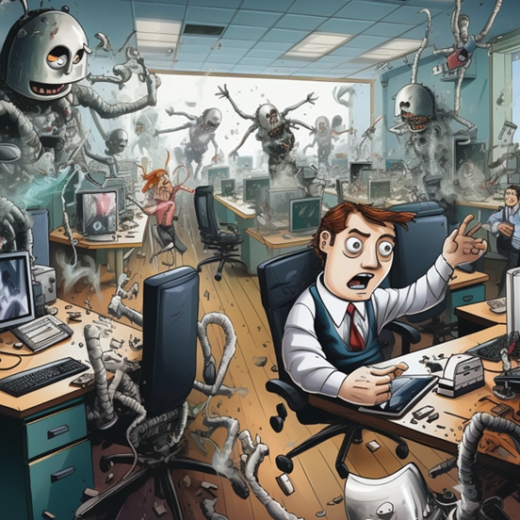
Public sector leadership in a rapidly changing world
Government and public services have changed substantially in the past decade. So too have the demands on public sector leaders. Faced with the challenges of austerity, COVID-19, demographic changes, different working models and what you can argue are the big ones – the climate emergency and technology – leaders are having to steer their organisations […]
Government and public services have changed substantially in the past decade. So too have the demands on public sector leaders.
Faced with the challenges of austerity, COVID-19, demographic changes, different working models and what you can argue are the big ones – the climate emergency and technology – leaders are having to steer their organisations through a period of unprecedented change.
This challenging landscape brings to the fore discussions around leadership and the evolving nature of the skills required to lead public sector organisations in the current unprecedented times – a subject that was discussed in a recent podcast.
Here’s a round-up of the key takeaways from this podcast, which you can also listen to in full.

The recent National Audit Office report that warned of a shortage of core leadership and improvement skills amongst leaders of government organisations…
Paul: “I found the report refreshing because it moved away from the financial pressures of the public sector and put much more emphasis on the importance of building cultures of trust and shared understanding both internally and externally with communities.
“It also opened up questions around innovation and how you create end-to-end services. How do you build the capacity within a culture to deliver better services? In America, they’re increasingly calling these ‘power skills’ – building relationships, understanding what communities and end-users need, pulling ideas from multiple sources and adding them to the vision or strategy for the organisation.”
The challenge of organisational culture…
Andy: “The pandemic has been a huge stress test for every organisation in terms of business continuity and whether you’ve got the right systems in place. There has been a massive shift in terms of an organisation’s ability to work online and pivot to online working, but I think the big test has been around the equality, diversity and inclusivity agenda. Do you know who you are and what you stand for as an organisation? What is your culture? What do you represent? This is a huge challenge that needs to be right at the forefront of the leadership agenda.”
Paul: “I think COVID-19 is a great equaliser that has driven real steps forward in leadership. Having to pull together to respond to the pandemic has shown how you can’t have the public, private and third sectors operating on different organisational models, according to a different kind of logic. We’re all together now and there’s some fluidity around how we’re developing services, how we’re meeting social-economic needs and working in partnership, rather than individual sector silos.”
Ioanna: “I don’t think this culture of partnership is new – but I do think that COVID-19 has accelerated the process. We need to focus on what brings people around the table and today, as it has been since the financial crash, it’s all about the lack of resources within the public sector. This is a problem that spans whole organisations, so we must sit down and solve it together in creative ways. Often, we end up looking at technology to help us to deliver more with fewer resources and the key leadership skills revolve around outcomes – thinking about what we want to achieve from it, not looking at what the technology does.
The climate emergency is another topic bringing people together around the table because there’s the realisation that you can’t tackle the problem alone.
It’s necessary to bring partners together and create consensus and enthusiasm to address the issues because they’re complex.”
Whether the skills exist within public sector leadership to take this holistic approach…
Ioanna: “I think they do exist, proven by how quickly they have reacted to the COVID-19 crisis. That said, we need more, especially when it comes to climate change. The UK Government has committed to reducing carbon emissions to net-zero by 2050. This will affect all the choices we make around energy, housing, infrastructure and community assets. For everybody to work on this agenda, we need to develop new skills, not only technical skills but the soft skills that leaders can use to bring people around the table from multiple sectors.”
Paul: “The idea that the public sector is an enabler is an interesting one. There’s an interesting discussion here about the skills needed to unblock good ideas. How do you allow creativity to percolate through the system? How do you reach communities and individuals, neighbourhoods and different organisations that know what’s happening on the ground?
The focus is not necessarily on the skills of expertise and specialism anymore, but on the skills of facilitation and creating a kind of collective intelligence.
“Also, we’ve mentioned climate change, but it’s also demographic change. It’s technology, migration…all these things are affecting the way that public sector organisations are engaging with their stakeholders, requiring different way of thinking and interaction.”
The need to rethink senior leadership teams…
Andy: “It’s an interesting dilemma. Often people are given responsibility alongside their other responsibilities. Equality, diversity and inclusion is a good example. While there’s an argument that it’s everybody’s responsibility, I think there’s a stronger argument to have dedicated members of staff on the executive who has primary responsibility for sustainability, for equality and so on, rather than making it part of someone’s role. I think it has to be led from the top down.”
Paul: “The counterargument is that, if leadership is about delivering social and economic value, there’s a benefit in bringing people together through a bottom-up approach. Local healthcare is interesting in the way it creates bottom-up mechanisms because they realise real learning takes place in the undergrowth of society, in civil society organisations, whether it’s faith groups, or whether it’s community groups, in schools or so on. So how do we create mechanisms for bottom-up solutions to understand the lived experiences of people? If we can do this and use it to inform and shape a leadership approach from the top-down, then it could be really exciting.”
The skills needed by the public sector to transform services today, tomorrow and beyond…
Ioanna: “Firstly, strategic thinking, and vision, are required. Leaders need to be able to identify and integrate the core values, which means empathy and passion for making a positive impact in society come to the fore. It’s also imperative we drive people around the table.”
Andy: “I would add that now is a real moment of digital transformation. Every organisation is reimagining what the new normal is going to look like. Within Ravensbourne, we won’t go back to what we were doing before, so how do we embed the good elements and the good learning from this experience? The pandemic has driven a lot of really good management behaviour. Gone are the days where you were measured by how many hours you were sitting at your desk, replaced by outputs and outcomes.
Leaders need to give people more flexibility and responsibility, and be open-minded to what the future looks like.”
Ioanna: “You also need the ability to make the right choices very quickly. There is a lot of information, and within this information there are different options. You must use data in the right way. The importance of data has come to the fore, meaning you can’t make decisions on anecdote and emotion. This is a must-have skill as we move forward.”
Paul: “While I don’t disagree that data and technology are important, there is a need for an emotional response too.
“One local authority that we work with identified a social isolation problem, particularly amongst older people. It’s a huge problem. There has been a real focus on using robots and the Internet of Things to deliver goods and provisions, which is all working very well. However, while these older people need provisions, the most important need is conversation. They need to meet people, they need emotional connectivity. Unless we can bring this ‘people’ element into digital transformation and the way we design services, I think we will be missing the most essential role of public services.”
The measures leaders can take to ensure they have the correct skills…
Paul: “I think the public sector can do more to learn from the private sector. For example, when it comes to prototyping services, what can we learn from the design thinking of the disrupting technology companies? How do they prototype? How do they test things? How do you create small groups and immersive experiences, and then scale up that testing and prototyping? How do you embed feedback loops? Once the knowledge we should then do more to share between authorities and leaders.”
Andy: “The public sector is very good at investing in staff development and active learning is absolutely core to that. We’re all on a journey and the moment you think you know it all, you’ve made a big mistake. So, leaders need to embrace lifelong learning and develop strategies to constantly and continuously improve what they’re doing to cope with an ever-changing environment.”
Ioanna: “I absolutely agree with the need for lifelong learning. The world is evolving, so have our skills…and they will continue to do so. I think it’s also interesting to change roles as well because our working lives last for many decades now.”
As discussed in the podcast, Ravensbourne University London and Global IT Solutions have launched a strategic partnership to design and deliver a high-level executive programme for senior leaders across the public sector.
We are seeking your views on this programme and would welcome your views on how new approaches to public sector leadership and development can be supported. The questionnaire takes no longer than 5 minutes to complete and can be found here.





